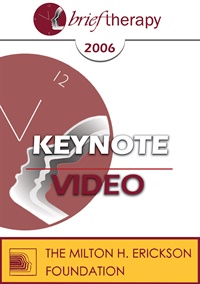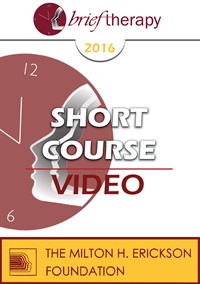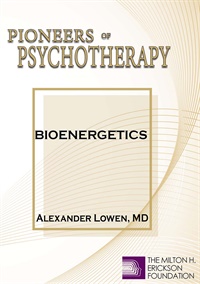
- Average Rating:
- Not yet rated
- Topic Areas:
- Clinical Demonstrations | Bioenergetics | Eating Disorders | Aging and Mortality | Psychotherapy | Abuse | Mind-Body
- Bundle(s):
- Pioneers of Psychotherapy Bundle
- Categories:
- Pioneers of Psychotherapy | Evolution of Psychotherapy | Evolution of Psychotherapy 2000
- Faculty:
- Alexander Lowen, MD
- Course Levels:
- Master Degree or Higher in Health-Related Field
- Duration:
- 00:59:00
- Format:
- Audio and Video
- Original Program Date:
- May 27, 2000
- Short Description:
- Alexander Lowen (2000) demonstrates with Ann, who he used as a ten years earlier. She reports that since that first session she has been free of severe asthma attacks. She is now troubled by the death of her father and mother, abuse from her brother, excessive weight gain and the onset of menopause. Lowen guides her through a series of movement exercises.
- Price:
- $59.00 - Base Price
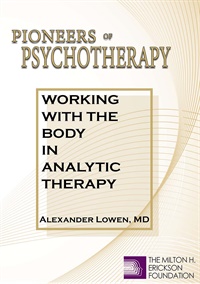
- Average Rating:
- Not yet rated
- Topic Areas:
- Clinical Demonstrations | Mind-Body | Psychotherapy | Bioenergetics
- Bundle(s):
- Pioneers of Psychotherapy Bundle
- Categories:
- Pioneers of Psychotherapy | Evolution of Psychotherapy | Evolution of Psychotherapy 1995
- Faculty:
- Alexander Lowen, MD
- Course Levels:
- Master Degree or Higher in Health-Related Field
- Duration:
- 01:01:00
- Format:
- Audio and Video
- Original Program Date:
- Dec 15, 1995
- Short Description:
- Alexander Lowen (1995) demonstrates with John who is dissatisfied with his body. Through exercises, Lowen helps John use his body to express his full range of feelings. Lowen explains that he does not rely on the mind to change behavior because of its lack of power. Lowen expects the body to free itself. The demonstration concludes with Lowen’s elaboration on his work.
- Price:
- $59.00 - Base Price
- Average Rating:
- Not yet rated
- Topic Areas:
- Keynotes | Brief Therapy | Mind-Body | Psychotherapy | Neuroscience
- Categories:
- Brief Therapy Conference | Brief Therapy Conference 2006
- Faculty:
- Daniel Siegel, MD
- Course Levels:
- Master Degree or Higher in Health-Related Field
- Duration:
- 1:01:01
- Format:
- Audio and Video
- Original Program Date:
- Dec 07, 2006
- Short Description:
- This keynote address will provide an overview of the interdisciplinary view of the mind and mental health. Over 60,000 mental health providers have been asked about their formal education in these areas and less than 5% have had seminars defining these two basic aspects of psychotherapy. This presentation will offer a view based on science of the definition of the mind and well-being and explore ways in which brief therapy can foster rapid and lasting change.
- Price:
-
Sale is $29.00
price reduced from Base Price - $59.00
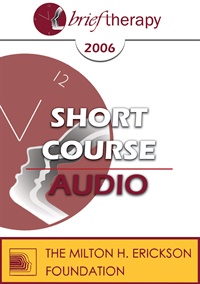
- Average Rating:
- Not yet rated
- Topic Areas:
- Short Courses | Addiction | Brief Therapy | Communication | Mind-Body | Utilization
- Categories:
- Brief Therapy Conference | Brief Therapy Conference 2006
- Faculty:
- Bart Walsh, MSW
- Duration:
- 1:19:30
- Format:
- Audio Only
- Original Program Date:
- Dec 07, 2006
- Short Description:
- This presentation poses a brief substance abuse treatment which acknowledges and accommodates the personal needs being addressed by substance use, bypasses perceived resistance and employs the essence of idiosyncratic psychobiological learning to achieve a body-mind gestalt complementary to the client's sobriety. Client self-empowerment and relapse prevention are built into the intervention. This method develops a safe framework for addressing any subsequent mental health themes directly or indirectly related to substance misuse. A particular form of body language known as ideomotor signaling is established in this procedure.
- Price:
- $15.00 - Base Price
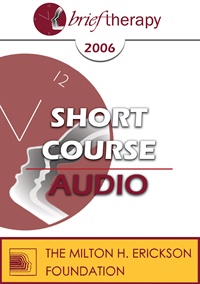
- Average Rating:
- Not yet rated
- Topic Areas:
- Short Courses | Borderline | Brief Therapy | Mind-Body | Neuroscience | Couples Therapy | Narcissism
- Categories:
- Brief Therapy Conference | Brief Therapy Conference 2006
- Faculty:
- Bruce Gregory, PhD
- Duration:
- 1:19:30
- Format:
- Audio Only
- Original Program Date:
- Dec 07, 2006
- Short Description:
- Dealing with narcissistic and borderline defenses that block healthy relating can be quite challenging when dealing with couples. This short course will address ways to creatively apply core aspects of Rossi's mind-body approach to develop treatment plans and interventions that can facilitate the containment of these defenses and help reorganize the dynamics of the couple system. The integration of the psychodynamic system and cognitive behavioral perspectives will be addresses throughout the course.
- Price:
- $15.00 - Base Price
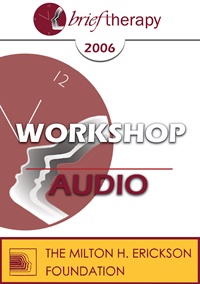
- Average Rating:
- Not yet rated
- Topic Areas:
- Workshops | Neuroscience | Psychotherapy | Brief Therapy | Mind-Body | Four-Stage Creative Process | Art and Creativity
- Categories:
- Brief Therapy Conference | Brief Therapy Conference 2006
- Faculty:
- Ernest Rossi, PhD
- Duration:
- 2:08:18
- Format:
- Audio Only
- Original Program Date:
- Dec 07, 2006
- Short Description:
- An introductory presentation reviewing how our daily mental activity may turn on the activity-dependent gene expression and protein synthesis cycle to construct and reconstruct the neural networks of our mind-brain and facilitate healing of the body. We will explore innovative approaches to facilitating the four-stage creative process in therapeutic hypnosis and psychotherapy in a group process and individual demonstrations.
- Price:
- $15.00 - Base Price
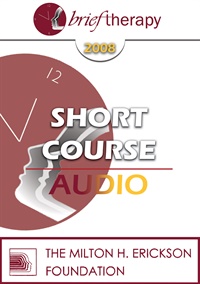
- Average Rating:
- Not yet rated
- Topic Areas:
- Short Courses | Mind-Body | Brief Therapy | Dysmorphia | Psychology | Weight Loss
- Categories:
- Brief Therapy Conference | Brief Therapy Conference 2008
- Faculty:
- Marc Oster, PsyD | Carolyn Sauer, Psy.D.
- Duration:
- 1:24:04
- Format:
- Audio Only
- Original Program Date:
- Dec 11, 2008
- Short Description:
- With the increase in weight loss surgery, both physical and psychological recovery is an important concern and struggle for patients. The focus of this short course will be on both body and "emotional dysmorphic disorder," that is not "seeing" oneself as others do. We will address how brief how brief, effective mind-body approaches can aid in resolving these conditions and enhance lasting recovery. Methods will include counseling, social support, massage, yoga, martial arts, acupuncture and exercise.
- Price:
- $15.00 - Base Price
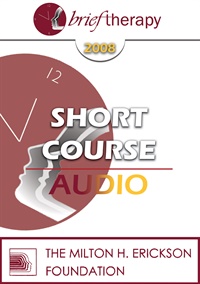
- Average Rating:
- Not yet rated
- Topic Areas:
- Short Courses | Addiction | Brief Therapy | Communication | Mind-Body | Utilization
- Categories:
- Brief Therapy Conference | Brief Therapy Conference 2008
- Faculty:
- Bart Walsh, MSW
- Duration:
- 1:24:25
- Format:
- Audio Only
- Original Program Date:
- Dec 11, 2008
- Short Description:
- This presentation poses a substance abuse treatment which acknowledges and accommodates the personal needs being addressed by substance use, bypasses perceived resistance and employs idiosyncratic psycho-biological learning to achieve a body-mind Gestalt complementary to the client's sobriety. Client self-empowerment and relapse prevention are built into the intervention. This method develops a safe framework for addressing any subsequent mental health themes directly or indirectly related to substance misuse. A simple form of bodymind communication, known as ideomotor questioning, is employed in this procedure. Because this is a new strategy, fundamental information applicable to all levels of professional experience, will be provided.
- Price:
- $15.00 - Base Price
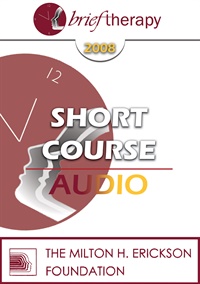
- Average Rating:
- Not yet rated
- Topic Areas:
- Short Courses | Addiction | Brief Therapy | Habits | Mind-Body | Mindfulness
- Categories:
- Brief Therapy Conference | Brief Therapy Conference 2008
- Faculty:
- Mary Augustyn, MS
- Duration:
- 1:16:00
- Format:
- Audio Only
- Original Program Date:
- Dec 11, 2008
- Short Description:
- Stop-Breathe-Focus (SBF) diffuses volatile situations, interrupts addictive/compulsive behaviors, resolves conflicts, facilitates healthy decisions and changes problematic behavior. SBF is useful to make changes quickly, to autopsy previous behaviors and to create a plan for behavior change; all in a simple, easy-to-use package.
- Price:
- $15.00 - Base Price
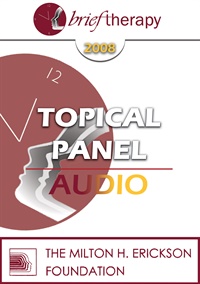
- Average Rating:
- Not yet rated
- Topic Areas:
- Topical Panels | Mind-Body | Brief Therapy
- Categories:
- Brief Therapy Conference | Brief Therapy Conference 2008
- Faculty:
- Jon Carlson | Robert Dilts, BA | Stephen Gilligan, PhD | Peter Levine, PhD
- Duration:
- 59:07
- Format:
- Audio Only
- Original Program Date:
- Dec 13, 2008
- Short Description:
- BT08 Topical Panel 02 - Mind-Body Issues - Jon Carlson, EdD, PsyD, Robert Dilts, Stephen Gilligan, PhD, Peter Levine, PhD
- Price:
- $15.00 - Base Price
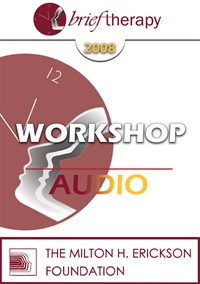
- Average Rating:
- Not yet rated
- Topic Areas:
- Workshops | Trauma | Brief Therapy | Mind-Body | Pain and Healing
- Categories:
- Brief Therapy Conference | Brief Therapy Conference 2008
- Faculty:
- Peter Levine, PhD
- Duration:
- 1:57:13
- Format:
- Audio Only
- Original Program Date:
- Dec 14, 2008
- Short Description:
- It is common to see clients who present with complex arrays of symptoms. These symptoms can be persistent or "mutate" unexpectedly, leaving patient and therapist feeling confused, frustrated and helpless. In this presentation, we will see how states of unresolved stress and trauma can be the underlying force that drives multiple elusive symptoms. These include panic, depression, insomnia, migraines, severe PMS, chronic pain, fibromyalgia and chronic fatigue.
- Price:
- $15.00 - Base Price
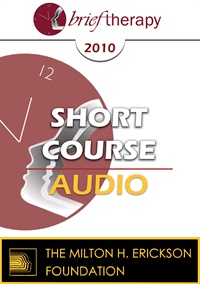
- Average Rating:
- Not yet rated
- Topic Areas:
- Short Courses | Brief Therapy | Mind-Body | Dysmorphia
- Categories:
- Brief Therapy Conference | Brief Therapy Conference 2010
- Faculty:
- Carolyn Sauer, Psy.D. | Marc Oster, PsyD
- Duration:
- 1:26:18
- Format:
- Audio Only
- Original Program Date:
- Dec 09, 2010
- Short Description:
- Physical and psychological recovery is an important concern for patients having had weight loss surgery or other significant body altering events. This workshop will focus on the physical and emotional experience of body dysmorphia, that is not “seeing” oneself as others do. We will address how brief mind-body approaches can aid in resolving these conditions and enhance lasting recovery. Methods will include counseling, social support, massage, yoga, martial arts, and exercise. With Carolyn Sauer and Marc Oster.
- Price:
- $15.00 - Base Price
Tags: Dysmorphia Mind-Body Brief Therapy
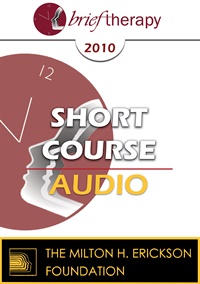
- Average Rating:
- Not yet rated
- Topic Areas:
- Neuroscience | Short Courses | Neurobiology | Brief Therapy | Mind-Body
- Categories:
- Brief Therapy Conference | Brief Therapy Conference 2010
- Faculty:
- Richard Hill, MBMSc, MEd, MA
- Duration:
- 1:30:17
- Format:
- Audio Only
- Original Program Date:
- Dec 09, 2010
- Short Description:
- Breakthroughs in neuroscience and neurophysiology explain how a mindset can alter what is turned on and turned off in the brain and the body. The work of Siegel, Rossi, Bandura, Aronson & Steele and Deci & Ryan act as pieces of a puzzle that explain why therapy can be disrupted by an imposed mindset and how this “winner/loser world” mindset is an unseen barrier to our more natural, creative, interpersonal process. A new, simple brief therapy is presented for lasting, transformational change.
- Price:
- $15.00 - Base Price
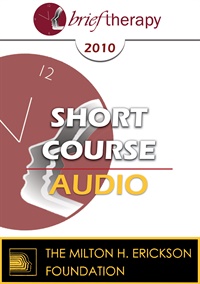
- Average Rating:
- Not yet rated
- Topic Areas:
- Short Courses | Meditation, Spirituality and Yoga | Mind-Body | Mindfulness | Multicultural | Belief Systems | Psychotherapy | Brief Therapy
- Categories:
- Brief Therapy Conference | Brief Therapy Conference 2010
- Faculty:
- Jeanne Hernandez
- Duration:
- 1:38:23
- Format:
- Audio Only
- Original Program Date:
- Dec 09, 2010
- Short Description:
- This workshop explores how the Indian belief system contains ingredients to keep the mind and body in harmony and promote wellbeing. We will explore adding into psychotherapy sessions totem strengths, shaman journeys, medicine wheels, time-frames, respect and gratitude; the circle of life, and symbols as reminders of the “right” path. With Jeanne Hernandez.
- Price:
- $15.00 - Base Price
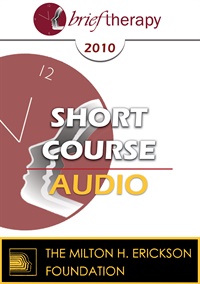
- Average Rating:
- Not yet rated
- Topic Areas:
- Addiction | Short Courses | Brief Therapy | Communication | Mind-Body | Utilization
- Categories:
- Brief Therapy Conference | Brief Therapy Conference 2010
- Faculty:
- Bart Walsh, MSW
- Duration:
- 1:32:27
- Format:
- Audio Only
- Original Program Date:
- Dec 09, 2010
- Short Description:
- This presentation poses a substance abuse treatment which acknowledges and accommodates the personal needs being addressed by substance use, bypasses perceived resistance and employs idiosyncratic psycho-biological learning to achieve a mind-body gestalt complementary to the client’s sobriety. Client self-empowerment and relapse prevention are built into the intervention. This method develops a safe framework for addressing any subsequent mental health themes directly or indirectly related to substance misuse. A simple form of mind-body communication known as ideomotor questioning is employed in this procedure. Because this is a new strategy, fundamental information applicable to all levels of professional experience will be provided.
- Price:
- $15.00 - Base Price
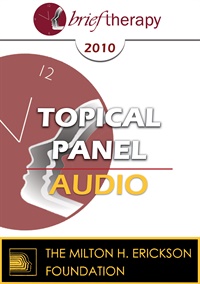
- Average Rating:
- Not yet rated
- Topic Areas:
- Topical Panels | Mind-Body
- Categories:
- Brief Therapy Conference | Brief Therapy Conference 2010
- Faculty:
- Lilian Borges, MA, LPC | Robert Dilts, BA | Stephen Gilligan, PhD | Maggie Phillips, PhD
- Duration:
- 1:02:53
- Format:
- Audio Only
- Original Program Date:
- Dec 11, 2010
- Short Description:
- BT10 Topical Panel 11 - Mind-Body Issues - Lilian Borges, MA, Robert Dilts, Stephen Gilligan, PhD, Maggie Phillips, PhD
- Price:
- $15.00 - Base Price
Tags: Mind-Body
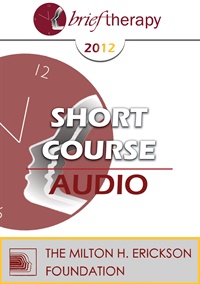
- Average Rating:
- Not yet rated
- Topic Areas:
- Short Courses | Neurobiology | Pain and Healing | Mind-Body
- Categories:
- Brief Therapy Conference | Brief Therapy Conference 2012
- Faculty:
- Anja Ferrari-Malik
- Duration:
- 1:23:38
- Format:
- Audio Only
- Original Program Date:
- Dec 05, 2012
- Short Description:
- BT12 Short Course 06 – Neuromuscular Awareness: A Mind-Body Method to Treat Patients with Chronic Pain – Anja Ferrari-Malik, MD Neuromuscular awareness is a method which focuses on the discovery and development of the skill to perceive one’s own internal bodily sensations and to act upon this awareness to reduce pain. The ability to recognize small bodily changes helps the client to create a new pathway in mind-body connection.
- Price:
- $15.00 - Base Price
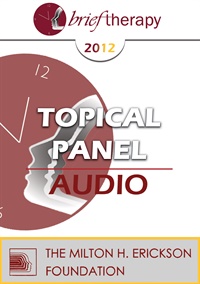
- Average Rating:
- Not yet rated
- Topic Areas:
- Topical Panels | Mind-Body
- Categories:
- Brief Therapy Conference | Brief Therapy Conference 2012
- Faculty:
- Stephen Gilligan, PhD | Peter Levine, PhD | Ernest Rossi, PhD | Ronald Siegel, PsyD
- Duration:
- 1:02:14
- Format:
- Audio Only
- Original Program Date:
- Dec 07, 2012
- Short Description:
- BT12 Topical Panel 12 - Mind-Body Issues - Stephen Gilligan, PhD, Peter Levine, PhD, Ernest Rossi, PhD, Ronald Siegel, PsyD
- Price:
- $15.00 - Base Price
Tags: Mind-Body
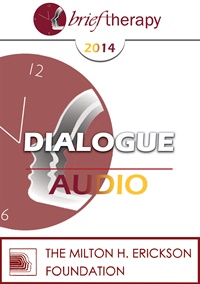
- Average Rating:
- Not yet rated
- Topic Areas:
- Hypnosis | Dialogues | Brief Therapy | Mind-Body
- Categories:
- Brief Therapy Conference | Brief Therapy Conference 2014
- Faculty:
- Michael Yapko, PhD | Ronald Siegel, PsyD
- Duration:
- 1:00:55
- Format:
- Audio Only
- Original Program Date:
- Dec 13, 2014
- Short Description:
- This session examines mindfulness and hypnosis side by side, considering their overlaps and distinctions in clinical practice. Panelists discuss dissociation, suggestion, and attentional focus, exploring how each tradition works with acceptance, transformation, and client responsiveness. Participants gain insight into how mindfulness cultivates metacognitive awareness while hypnosis mobilizes experiential shifts, offering complementary tools for pain management, depression, and the cultivation of resilience.
- Price:
- $15.00 - Base Price
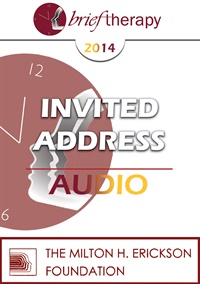
- Average Rating:
- Not yet rated
- Topic Areas:
- Post-Traumatic Stress Disorder (PTSD) | Meditation, Spirituality and Yoga | Invited Addresses | Trauma | Mind-Body
- Categories:
- Brief Therapy Conference | Brief Therapy Conference 2014
- Faculty:
- Bessel van der Kolk, MD
- Duration:
- 1:00:58
- Format:
- Audio Only
- Original Program Date:
- Dec 14, 2014
- Short Description:
- Chronic trauma interferes with self-perception and self-regulation. We will discuss effective approaches.
- Price:
- $15.00 - Base Price
- Average Rating:
- Not yet rated
- Topic Areas:
- Addiction | Short Courses | Utilization | Mind-Body
- Categories:
- Brief Therapy Conference | Brief Therapy Conference 2016
- Faculty:
- Bart Walsh, MSW
- Course Levels:
- Master Degree or Higher in Health-Related Field
- Duration:
- 1:30:02
- Format:
- Audio and Video
- Original Program Date:
- Dec 08, 2016
- Short Description:
- This presentation poses a substance abuse treatment which acknowledges and accommodates the personal needs being addressed by substance use, bypasses perceived resistance and employs idiosyncratic psycho-biological learning to achieve a body-mind gestalt complementary to the client’s sobriety. Client self empowerment and relapse prevention are built into the intervention This method develops a safe framework for addressing any subsequent mental health themes directly or indirectly related to substance misuse. Ideomotor questioning is employed as a practical conduit to body-mind communication and function.
- Price:
- $0.00 - $29.00
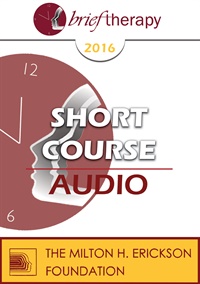
- Average Rating:
- Not yet rated
- Topic Areas:
- Short Courses | Experiential Therapy | Mind-Body | Stress | Brief Therapy | Hypnosis
- Categories:
- Brief Therapy Conference | Brief Therapy Conference 2016
- Faculty:
- Helen Adrienne, LCSW, BCD
- Duration:
- 1:26:16
- Format:
- Audio Only
- Original Program Date:
- Dec 08, 2016
- Short Description:
- This short course presents a collection of quick, practical mind-body techniques that help clients interrupt stress and return to a grounded state. Through demonstrations of breathwork, posture shifts, guided imagery, energy activation, and paper-labyrinth exploration, participants see how small sensory cues can settle the nervous system and restore a sense of agency. The session also offers language tools, hypnotic framings, and creative metaphors that clients can use anytime to reduce overwhelm and re-engage with the present moment.
- Price:
- $15.00 - Base Price
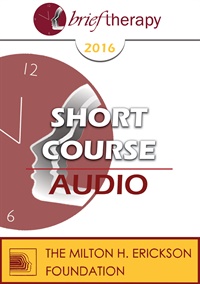
- Average Rating:
- Not yet rated
- Topic Areas:
- Couples Therapy | Short Courses | Brief Therapy | Experiential Therapy | Mind-Body | Psychotherapy | Utilization | Meditation, Spirituality and Yoga
- Categories:
- Brief Therapy Conference | Brief Therapy Conference 2016
- Faculty:
- Sheldon Kramer, PhD
- Duration:
- 1:29:47
- Format:
- Audio Only
- Original Program Date:
- Dec 08, 2016
- Short Description:
- Participants will learn powerful techniques to facilitate the integration of individual and couples therapy through meditation, guided imagery, and energy centers in the body. Beginning exploration will focus on the healing capacity found innately in the "Mind- Body Couples System" (Mind Body Systems Therapy( TM) through the use of intense affect to unify significant others through transforming fear, anger, and grief into understanding ,compassion, love, and forgiveness. The class will be both didactic and experiential.
- Price:
- $15.00 - Base Price
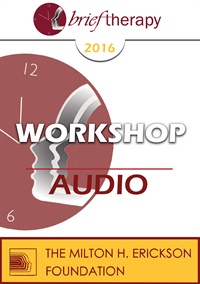
- Average Rating:
- Not yet rated
- Topic Areas:
- Meditation, Spirituality and Yoga | Workshops | Mind-Body | Ericksonian Hypnosis and Therapy Techniques | Neuroscience
- Categories:
- Brief Therapy Conference | Brief Therapy Conference 2016
- Faculty:
- Ernest Rossi, PhD | Carolyn Sauer, Psy.D.
- Duration:
- 2:32:44
- Format:
- Audio Only
- Original Program Date:
- Dec 09, 2016
- Short Description:
- How can we optimize classical yoga with Ericksonian mind-body work? This experiential workshop utilizes Ericksonian approaches with the entire audience as well as individual volunteers. Through story and movement we will access new dimensions of our emerging consciousness with the 4-stage creative psychosocial genomic cycle. Open for all fitness levels.
- Price:
- $15.00 - Base Price
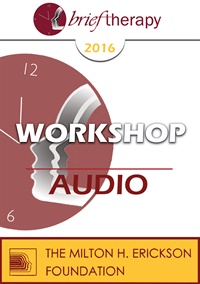
- Average Rating:
- Not yet rated
- Topic Areas:
- Psychotherapy | Workshops | Mind-Body | Brief Therapy | Meditation, Spirituality and Yoga
- Categories:
- Brief Therapy Conference | Brief Therapy Conference 2016
- Faculty:
- Ernest Rossi, PhD | Richard Hill, MBMSc, MEd, MA
- Duration:
- 2:41:12
- Format:
- Audio Only
- Original Program Date:
- Dec 11, 2016
- Short Description:
- We will summarize the Rossi 50+ year saga of exploring the theory, research and practice of Mind-Body Psychotherapy with live demonstrations for the entire audience as well as individual volunteers with a focus on 4 Essential keys: 1. Milton Erickson’s Minimal Cues Optimizing Therapeutic Hypnosis, 2. The 90-120 minute 4-Stage Creative Cycle, 3.The Novelty-Numinosum-Neurogenesis Effect , 4.The Basic Rest-Activity Cycle of Everyday Mind-Body Healing. Yoga activity will be experienced as appropriate through-out.
- Price:
- $15.00 - Base Price


